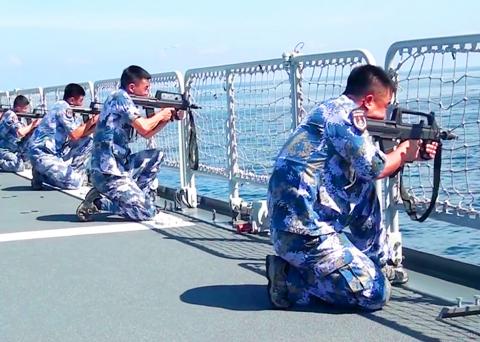China has said it would stage military exercises in the East China Sea near Taiwan this week.
This would be the third set of drills in a month and comes after the recent US approvals of arms sales worth billions to Taiwan, including F-16 jets.
Ships would be prohibited from entering the waters off the coast of China’s Zhejiang Province for 48 hours starting from 6pm yesterday because of the military exercises, the Zhejiang Maritime Safety Administration said in a brief notice on Monday.

Photo: Chen Cheng-liang, Taipei Times
The administration did not offer details on the scale of the exercises or which military units were involved.
State-backed newspaper Global Times called it a “live-fire drill.”
The Chinese People’s Liberation Army late last month held two large military drills close to the Taiwan Strait.
“The idea is to better prepare for conflict, but also deter ... Taiwan [from] going down the path of independence or, failing that, a US intervention if conflict breaks out between China and Taiwan,” said Adam Ni (倪凌超), China researcher at Macquarie University in Sydney.
The series of drills follows a defense white paper published last month, in which the Chinese military warned about a growing challenge from pro-independence forces in Taiwan.
Ties between Beijing and Taipei have plummeted since President Tsai Ing-wen (蔡英文) took office in 2016, because her party refuses to recognize the idea that Taiwan is part of “one China.”
In response, Beijing has cut official communications, ramped up military exercises, poached diplomatic allies and increased economic pressure on the nation.
China sees Taiwan as part of its territory awaiting unification, by force if necessary.

US President Donald Trump yesterday announced sweeping "reciprocal tariffs" on US trading partners, including a 32 percent tax on goods from Taiwan that is set to take effect on Wednesday. At a Rose Garden event, Trump declared a 10 percent baseline tax on imports from all countries, with the White House saying it would take effect on Saturday. Countries with larger trade surpluses with the US would face higher duties beginning on Wednesday, including Taiwan (32 percent), China (34 percent), Japan (24 percent), South Korea (25 percent), Vietnam (46 percent) and Thailand (36 percent). Canada and Mexico, the two largest US trading

ACTION PLAN: Taiwan would expand procurement from the US and encourage more companies to invest in the US to deepen bilateral cooperation, Lai said The government would not impose reciprocal tariffs in retaliation against US levies, President William Lai (賴清德) said yesterday, as he announced five strategies to address the issue, including pledging to increase Taiwanese companies’ investments in the US. Lai has in the past few days met with administrative and national security officials, as well as representatives from various industries, to explore countermeasures after US President Donald Trump on Wednesday last week announced a 32 percent duty on Taiwanese imports. In a video released yesterday evening, Lai said that Taiwan would not retaliate against the US with higher tariffs and Taiwanese companies’ commitments to

‘SPECIAL CHANNEL’: Taipei’s most important tasks are to stabilize industries affected by Trump’s trade tariffs and keep negotiations with Washington open, a source said National Security Council Secretary-General Joseph Wu (吳釗燮) arrived in the US for talks with US President Donald Trump’s administration, a source familiar with the matter said on Friday. Wu was leading a delegation for a meeting known as the “special channel,” the Financial Times reported earlier. It marked Trump’s first use of the channel since returning to the White House on Jan. 20. Citing a source familiar with the matter, the Financial Times reported that Minister of Foreign Affairs Lin Chia-lung (林佳龍) was also a part of the delegation. The visit came days after China concluded war games around Taiwan and amid Trump’s

CHIP EXCEPTION: An official said that an exception for Taiwanese semiconductors would have a limited effect, as most are packaged in third nations before being sold The Executive Yuan yesterday decried US President Donald Trump’s 32 percent tariff on Taiwanese goods announced hours earlier as “unfair,” saying it would lodge a representation with Washington. The Cabinet in a statement described the pledged US tariffs, expected to take effect on Wednesday next week, as “deeply unreasonable” and “highly regrettable.” Cabinet spokeswoman Michelle Lee (李慧芝) said that the government would “lodge a solemn representation” with the US Trade Representative and continue negotiating with Washington to “ensure the interests of our nation and industries.” Trump at a news conference in Washington on Wednesday announced a 10 percent baseline tariff on most goods